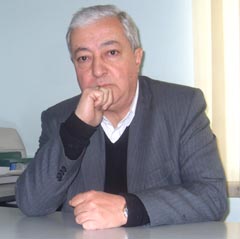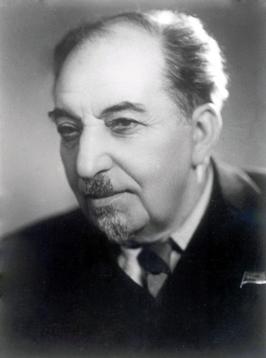
 |
The grandson: Avik Isahakyan |
Azad-Hye
The famous poet / writer Avetik Isahakyan's grandson Avik Isahakyan (Professor, Doctor of Philological Sciences and Director of the Institute of Literature of the National Academy of Sciences in Armenia), tells us about his memories of his grandfather.
– Isahakyan's genius has reached us through his amazing works. Thanks to them, many generations to come will be able to get in touch with the “Isahakyan” phenomenon. What does being the great poet's grandson feel like?
It was because of him that I had a unique ideology regarding life since my early ages. I was convinced that life was infinitely interesting. Our house was overwhelmed with spiritual and cultural atmosphere. I felt that I was in the centre of important historical events. Amazing personalities used to come over to our place, like his Holiness late Catholicos Vazken I, Viktor Hambardzumyan, communist leaders Anton Kochinian and Yakov Zarobyan, the great writers Derenik Demirchyan, Stepan Zoryan and Hamo Sahyan. One of our house's permanent and most beloved guests was the inimitable artist Mardiros Sarian.
-How did Avetik Isahakyan prefer to spend his leisure time?
Grandpa was a very friendly person. If he didn't have a previous arrangement to meet someone at the house, he used to tell his wife: “Sofik, shall we go somewhere?”. He didn't like to stay home. I remember in one of her letters, my grandma wrote to him from Paris saying: “Avetik, it seems like you're spending so much time with the guys, going to gatherings, you're not home much”, to which he replied: “I'm doing it intentionally, because as soon as I'm alone, I remember the old days and I feel like going out.”
-Did he lead the way to your first literary attempts?
I went to Moscow with my mother once. We visited the Tretyakov State Gallery. I used to have a notebook as a diary. My mother suggested that I jot down my impressions and feelings. I was ten years old. And I did so. In one of my descriptions of a painting, I used the word “arm”. After we came back, I showed grandpa what I had written. He read it, smiled and said that when he was at my age he didn't know the word “arm”, so I understood that he had liked it. I was only 13 years old when my grandfather passed away. Like all other children, I was more interested in games and unfortunately I stopped writing in my diary.
-When did the great poet say “don't” to you?
He was such a democratic person, he never used the word “don't”,but he didn't like it when I messed with his books. I used to sit under the desk and play with them. I remember I was admitted to a musical school to play the piano. But I didn't like it and I always skulked. Nevertheless I passed to the second level. One day, my music school principal came to visit us. My family asked him how I was doing. And he said in amazement: “But why do you ask? It's been a year since he stopped playing”. My granddad started to laugh so hard and said: “Leave the boy alone, the piano is for girls, let him play football outside”. And so, the piano problem was solved. I truly believe that if you don't have a God-given talent, then you shouldn't take up anything.
-What would really irritate Isahakyan?
The neighbors used to come to our house and complain that the country was full of Russian schools and that the Armenian language was facing a great danger, but later they took their own children to those schools. This really made him mad. He was also irritated by the Soviet tyranny. He used to say that “The Kremlin butcher continues to destroy everything that is Armenian”. I remember when we heard about Stalin's death, there was great joy in our house. “God has sent him to eternal darkness”, he used to say over and over.
-What did he dream of?
He dreamt that our nation would survive and that we would have a united and free Armenia. He was extremely patriotic and all his dreams were about Armenia's welfare. He had great love and ached for the Armenian Diaspora, he used to say that they are our brothers who – by fate – were forced to live out of their homeland. The Armenian Genocide was an incurable wound in his soul. I should also mention that his hatred for Turks was infinite. He always dreamed of a solution to the Armenian problem.
Translated by Nanor Mikayelian
 |
The grandfather: Avetik Isahakyan |
Ավետիք Իսահակյանը`որպես մեծ հայր
Մարգարիտա Հովհաննիսյան
Ազատ-Հայ
Հուշեր է պատմում հանրահայտ բանաստեղծ Ավետիք Իսահակյանի թոռը` Ավիկ Իսահակյանը (Բանասիրական գիտությունների դոկտոր- պրոֆեսոր, ՀՀ գիտությունների ազգային ակադեմիայի գրականության ինստիտուտի տնօրեն):
-Իսահակյանական հանճարը մեզ հասու է նրա հրաշալի ստեղծագործություններով. դրանց շնորհիվ դեռ քանի՜ սերունդներ հաղորդակից են դառնալու Ավետիք Իսահակյան երևույթին: Մեծ բանաստեղծի թոռ լինելն ի՞նչ զգացողություններ է պարգևում:
Իսահակյանի ներկայության շնորհիվ էր, որ մանուկ հասակից արդեն կյանքի հանդեպ առանձնահատուկ աշխարհայացք ունեի` համոզված էի, որ այն անսահման հետաքրքիր է: Մեր տան մթնոլորտը միշտ թաթախված էր հոգևոր-մշակութային շնչով: Ինձ զգում էի կարևոր ու պատմական իրադարձությունների կենտրոնում. հյուրընկալում էինք այնպիսի անհատականությունների, ինչպիսիք են Վազգեն Առաջին Երջանկահիշատակ Վեհափառը, Վիկտոր Համբարձումյանը, կոմունիստ ղեկավարներ Անտոն Քոչինյանը, Յակով Զարուբյանը, ժամանակի հայ մեծ գրողներ Դերենիկ Դեմիրճյանը, Ստեփան Զորյանը, Համո Սահյանը: Մեր տան մշտական ու ամենասիրելի հյուրերից էր անզուգական նկարիչ Մարտիրոս Սարյանը:
-Ազատ ժամանակն ինչպե՞ս էր նախընտրում տնօրինել Ավետիք Իսահակայանը:
Պապիկը շատ մարդամոտ անձնավորություն էր: Եթե նախօրոք պայմանավորվածություն չէր ունենում տանը մեկին ընդունելու, տիկնոջն ասում էր` ?Սոֆիկ, մի տեղ չգնա՞նք?: Չէր սիրում տանը նստել: Հիշում եմ` նամակներից մեկում տատս Փարիզից գրում է. ?Ախր, Ավետիք, կարծես շատ ես տղաների հետ հանդիպում, ինչ-որ քեֆերի ես գնում, քիչ ես տանը մնում?: Իսահակյանն էլ պատասխանել էր. ?Ես դա դիտավորյալ եմ անում. հենց որ մենակ եմ մնում, հին օրերն եմ հիշում, և` զգում եմ, որ արդեն պիտի դուրս գամ?:
-Գրական առաջին փորձերի ճանապարհին Ձեզ ուղղորդո՞ւմ էր:
Հիշում եմ` մի անգամ մայրիկիս հետ Մոսկվա էինք գնացել: Այցելեցինք Տրետյակովյան պատկերասրահ: Ես տետր ունեի, որը որպես օրագիր էի օգտագործում: Մայրս առաջարկեց զգացողություններս ու տպավորություններս գրի առնեմ: Ես տասը տարեկան էի այդ ժամանակ: Գրեցի-գրեցի, մի պատկերի նկարագրության մեջ ?բազուկ? բառն էի օգտագործել: Հետո, երբ վերադարձանք, պապիկին ցույց տվեցի նյութս: Կարդաց ու ժպտալով ասաց, որ ինքն իմ տարիքում բազուկ բառը չգիտեր. հասկացա, որ հավանել էր: Ընդամենը տասը տարեկան էի և հաջորդ երեք տարիներին էլ (տասներեք տարեկան էի, երբ պապիկը հեռացավ կյանքից) մյուս երեխաների նման ինձ ավելի շատ խաղերն էին ձգում, ու, ցավոք, օրագիր գործածելը դադարեցրի:
-Բանաստեղծը թոռանը ե՞րբ էր ?չի կարելի? ասում:
Իսահակյանը շատ դեմոկրատ մարդ էր, չի կարելի չէր ասում, սակայն չէր սիրում, երբ գրքերն էի խառնում. մտնում էի գրասեղանի տակ ու խաղում էի դրանցով: Հետո հիշում եմ` ինձ ընդունել էին երաժշտական դպրոց` դաշնամուր պիտի նվագեի: Բայց սեր կամ ձգտում չունեի վերջինիս հանդեպ ու շարունակ գլուխ էի պահում: Այդուհանդերձ, մի կերպ փոխադրվեցի երկրորդ դասարան: Երաժշտական դպրոցիս տնօրենը մի օր մեր տուն հյուր էր եկել: Տանեցիներն հարցրեցին, թե ինչպիսի հաջողություններ ունի իրենց տղան: Նա զարմացավ` ինչպես թե` նա մի տարի է ինչ չի նվագում: Պապս այնպե?ս ծիծաղեց. ?Երեխային հանգիստ թողեք, դա աղջկա գործ է, ինքը թող դրսում ֆուտբոլ խաղա?: Այդպիսով դաշնամուրի հարցը փակվեց: Իրականում էլ կարծում եմ` եթե տաղանդ` ի վերուստ տրված շնորհ չկա, պետք չէ հանձն առնել ոչինչ:
-Իսահակյանին ի՞նչը կարող էր խիստ զայրացնել:
Հարևանները գալիս էին մեր տուն ու նեղսրտում, որ երկրում ռուսացում է տեղի ունենում` ռուսական դպրոցներին թիվ չկա, խոսում էին հայոց լեզվին սպառնացող մեծ վտանգի մասին, սակայն հաջորդ օրն իրենք էլ երեխաներին տանում էին այդ դպրոցները: Պապիկին սա զայրացնում էր, իսկ առավել խիստ զայրացնում էր սովետական բռնապետությունը. ասում էր` այդ Կրեմլյան դահիճը ծրագրված կերպով ոչնչացնում է հայկականը: Հիշում եմ` երբ իմացանք Ստալինի մահվան լուրը, մեր տանը ցնծություն էր: ?Աստված նրան ուղարկեց հավերժ մթություն?,-կրկնում էր Իսահակյանը:
-Ո՞րն էր նրա երազանքը:
Որ հարատևի մեր ժողովուրդը, ստեղծվի միացյալ, անկախ Հայաստան: Նա անսահման հայրենասեր էր և բոլոր իղձերը հայրենիքի հետ էին կապված` վերջինիս բարօրությանն էին վերաբերում: Մեծ սեր ու սրտացավություն ուներ Սփյուռքի հանդեպ, ասում էր` նրանք մեր եղբայրներն են, ովքեր ճակատագրի բերումով հայտնվել են օտարության մեջ: Հայոց Եղեռնը նրա հոգում մի անբուժելի վերք էր: Ի դեպ, Իսահակյանի թրքատյացությունն անսահման էր: Նրա երազանքն էր նաև Հայկական հարցի լուծումը:
